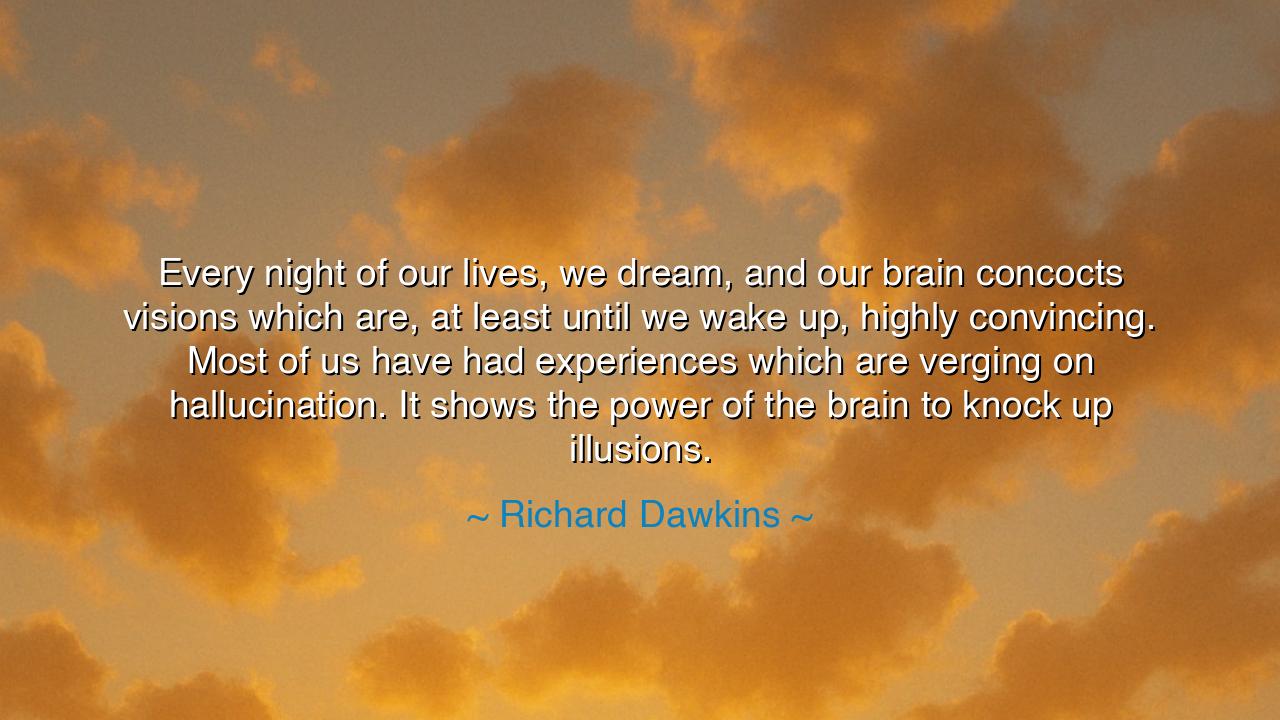
Every night of our lives, we dream, and our brain concocts
Every night of our lives, we dream, and our brain concocts visions which are, at least until we wake up, highly convincing. Most of us have had experiences which are verging on hallucination. It shows the power of the brain to knock up illusions.






Richard Dawkins, ever the interpreter of nature’s mysteries, proclaims: “Every night of our lives, we dream, and our brain concocts visions which are, at least until we wake up, highly convincing. Most of us have had experiences which are verging on hallucination. It shows the power of the brain to knock up illusions.” In these words, he lays bare the fragile line between what we call reality and what is woven by the mind. The brain, architect of thought and reason, is also a master of illusions, conjuring worlds so vivid that we believe them until the dawn dispels their shadows.
The meaning is as wondrous as it is humbling. If in the silence of sleep the mind can craft entire realms—faces, voices, terrors, and joys—so convincing that we are fooled utterly, how much more must we question the illusions we embrace in waking life? Dawkins reminds us that perception is not a mirror but a canvas, painted by the brain’s own hand. To be wise, then, is to recognize the limits of our senses and to admit that truth is often obscured by the veils of imagination.
History gives us examples of those who confronted this mystery. Consider René Descartes, who in his Meditations confessed that dreams were so persuasive that he could not distinguish them from waking life. From this uncertainty, he forged the famous thought: “I think, therefore I am.” Descartes sought one foundation beyond illusion—the existence of the thinking self. His struggle shows the same truth Dawkins highlights: that the human mind is both the vessel of truth and the craftsman of deceitful visions.
This insight also warns us against the arrogance of certainty. Just as the dreamer is convinced of his dream until he wakes, so too may we be convinced of falsehoods until greater knowledge dawns upon us. Superstitions, delusions, and even entire systems of belief may be but waking hallucinations, crafted by the same mental powers that create the phantoms of sleep. The wise, therefore, walk with humility, questioning their own perceptions, seeking evidence, and never resting in blind confidence.
Therefore, let us marvel at the power of the brain—a gift that can both illuminate and deceive. Dreams remind us that reality is more delicate than we suppose, and that the mind has within it both a philosopher and a trickster. To live wisely is not to despise this mystery, but to study it, to question it, and to seek the light that distinguishes truth from illusion. For though the brain may “knock up illusions,” it is also the same instrument through which we awaken to knowledge, beauty, and the eternal quest for understanding.






LPThao Le phuong
I find myself questioning the limits of scientific understanding here. If our brain can fabricate entire experiences indistinguishable from reality, what does that say about the nature of consciousness? Is it just a neurological process, or something deeper we haven’t yet understood? This quote makes me think that science and philosophy might need to meet halfway to explain how the mind produces realities that can feel so completely authentic.
NNNguyen Nguyen
This quote captures something hauntingly beautiful about human consciousness. It shows how fragile our grasp on reality really is. I wonder, though, does Dawkins see this as diminishing human experience or enhancing it? Maybe the fact that our brains can create such convincing illusions is what makes imagination, art, and empathy possible. Perhaps illusion isn’t the opposite of truth but a necessary part of how we make sense of existence.
NLNguyen Thi Ngoc Lan
I can’t help but feel amazed by the sheer complexity of the human brain. The idea that it can simulate entire worlds every night is mind-blowing. But it also raises a disturbing thought—if our minds can trick us so easily, how can we trust our perceptions in waking life? What if many of our ‘truths’—memories, beliefs, even feelings—are built on the same mechanisms that produce dreams and hallucinations?
TMNguyen Thi Mau
This statement makes me wonder about the evolutionary purpose of dreams and illusions. If our brains are capable of crafting such detailed fabrications, what advantage does that give us? Is it creativity, emotional regulation, or just a side effect of our complex cognition? I’d love to hear more about whether Dawkins sees these illusions as beneficial to human survival or simply as glitches in the brain’s endless processing.
HTHuyen Tran
I find this observation both scientific and philosophical. Dawkins seems to suggest that our sense of reality is fragile, built on the brain’s constant interpretation. But if dreams and hallucinations can feel so real, doesn’t that imply consciousness itself is a kind of illusion? It’s unsettling to think that what we call ‘truth’ might just be the brain’s most stable illusion. Do we ever experience anything objectively, or only subjectively?